2020秋九年级英语上册 9 Great inventions Unit 1 Will computers be used more than
九年级英语上册 Module 9 Great inventions Unit 1 Will computers be used more than books in the future
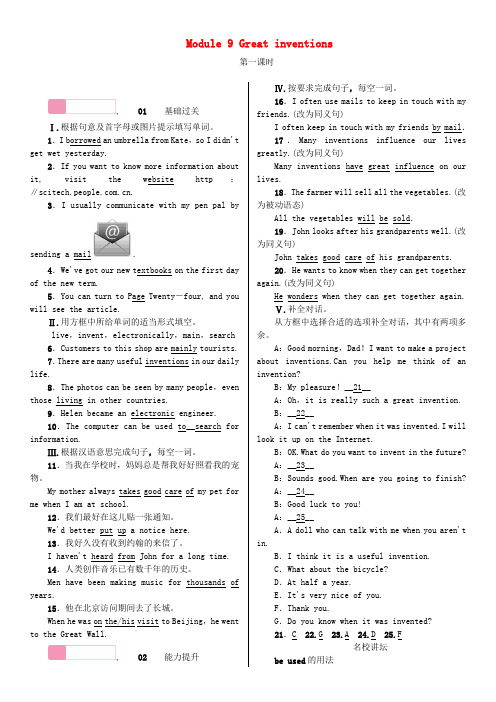
Module 9 Great inventions第一课时, 01 基础过关Ⅰ.根据句意及首字母或图片提示填写单词。
1.I borrowed an umbrella from Kate ,so I didn't get wet yesterday.2.If you want to know more information about it, visit the website http :∥.3.I usually communicate with my pen pal bysending a mail .4.We've got our new textbooks on the first day of the new term.5.You can turn to Page Twenty -four, and you will see the article.Ⅱ.用方框中所给单词的适当形式填空。
live ,invent ,electronically ,main ,search 6.Customers to this shop are mainly tourists. 7.There are many useful inventions in our daily life.8.The photos can be seen by many people ,even those living in other countries.9.Helen became an electronic engineer.10.The computer can be used to__search for information.Ⅲ.根据汉语意思完成句子,每空一词。
11.当我在学校时,妈妈总是帮我好好照看我的宠物。
My mother always takes good care of my pet for me when I am at school.12.我们最好在这儿贴一张通知。
九年级英语上册MODULE9GREATINVENTIONSUNIT1WILLPUTERSBEUSED
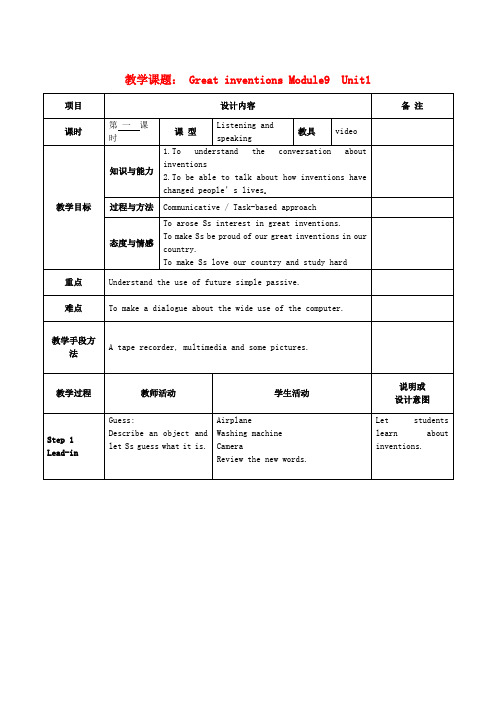
= I get / receive a letter from my sister every two
Weeks.
How often do you hear from your sister?
5.thousn use TV to know what is happening in
Other places.
3.—We can use washing machine to wash our clothes.
--We can easily make our clothes clean.
课后反思
Step 10 Acting
Ask Ss to answer the
questions.
Ss answer the questions.
Step 11
Language Points
1.put up:张贴;公布;挂起
You can put up the map on the wall.
Put up your hand if you know the answer.
Step 12
Listening
Listen and mark the pauses.
1.They’ll be put up on the school website.And they can be seen on the Internet by other classes, even people living in other countries.
Tony wants to borrow his father's camera and take some photos of the school dance and the basketball match. The photos will be shown in the school magazine. Tony's dad lends the camera. He promises Tony to look after it.
外研版英语九年级上册(教学设计)Module 9 Unit 1
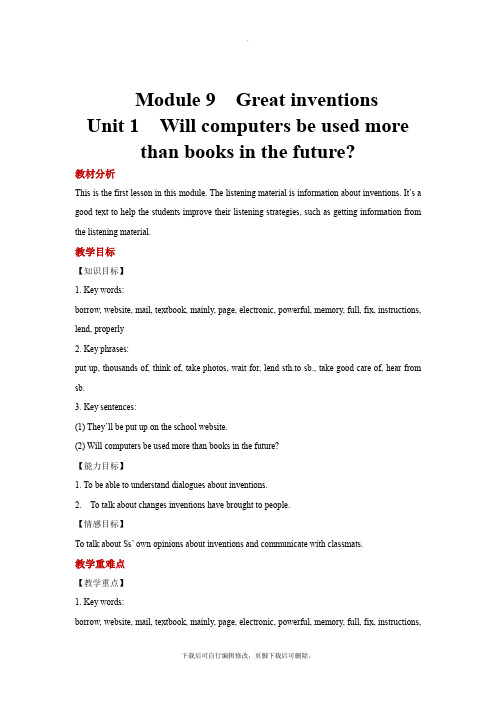
Module 9Great inventions Unit 1Will computers be used more than books in the future?教材分析This is the first lesson in this module. The listening material is information about inventions. It’s a good text to help the students improve their listening strategies, such as getting information from the listening material.教学目标【知识目标】1. Key words:borrow, website, mail, textbook, mainly, page, electronic, powerful, memory, full, fix, instructions, lend, properly2. Key phrases:put up, thousands of, think of, take photos, wait for, lend sth.to sb., take good care of, hear from sb.3. Key sentences:(1) They’ll be put up on the school website.(2) Will computers be used more than books in the future?【能力目标】1. To be able to understand dialogues about inventions.2. To talk about changes inventions have brought to people.【情感目标】To talk about Ss’ own opinions about inventions and communicate with classmats.教学重难点【教学重点】1. Key words:borrow, website, mail, textbook, mainly, page, electronic, powerful, memory, full, fix, instructions,lend, properly2. Key phrases:put up, thousands of, think of, take photos, wait for, lend sth.to sb., take good care of, hear from sb.3. Key sentences:(1) They’ll be put up on the school website.(2) Will computers be used more than books in the future?【教学难点】To improve listening and speaking abilities.课前准备Multimedia教学过程Step I Warming up and leading in(I) Warm up(A) T introduces four great inventions in ancient China: compass, paper-making gunpowder and printing.(B) T: With the electronic technology, we have more electronic inventions.Ss name more electronic inventions and talk about them.(II) IntroductionWork in pairs. Look at the pictures and answer the questions.(III) PracticeListen and complete the sentences.【设计意图】通过对图片的直观观察和讨论以及对问题的答复,使学生熟悉相关词汇,熟悉本单元话题,并导入新课。
外研版九年级英语上册教学设计《Module 9 Great inventions Unit 1》

外研版九年级英语上册教学设计《Module 9 Great inventions Unit 1》一. 教材分析《Module 9 Great inventions Unit 1》主要介绍了四大发明:造纸术、印刷术、指南针和火药。
本课旨在让学生了解中国古代的四大发明及其对世界文明发展的贡献。
教材通过讲述这些发明的历史背景、发明过程以及它们对人类社会的影响,激发学生对科学知识的兴趣,培养学生的创新意识。
二. 学情分析九年级的学生已经具备了一定的历史知识,对四大发明有一定的了解。
但在英语表达方面,学生可能对这些发明的英文名称和描述还不够熟悉。
因此,在教学过程中,教师需要帮助学生回顾相关历史知识,并加强英语表达的训练。
三. 教学目标1.知识目标:–学生能够掌握有关四大发明的英文名称和简单描述。
–学生能够用英语简要介绍四大发明及其对世界文明的影响。
2.能力目标:–学生能够运用所学知识,进行听力、口语、阅读和写作的训练。
–学生能够通过合作学习,提高与他人沟通和协作的能力。
3.情感目标:–学生能够激发对科学知识的兴趣,培养创新意识。
–学生能够认识到中华文明的伟大,增强民族自豪感。
四. 教学重难点•学生能够掌握有关四大发明的英文名称和简单描述。
•学生能够用英语简要介绍四大发明及其对世界文明的影响。
•学生能够运用所学知识,进行听力、口语、阅读和写作的训练。
•学生能够通过合作学习,提高与他人沟通和协作的能力。
五. 教学方法1.任务型教学法:通过完成各种任务,激发学生的学习兴趣,培养学生的实践能力。
2.合作学习:鼓励学生分组讨论,提高学生的沟通和协作能力。
3.情境教学法:创设情境,让学生在真实的环境中运用所学知识。
4.语法翻转教学法:通过引导学生发现和总结语法规则,提高学生的语言运用能力。
六. 教学准备1.教师准备PPT,展示四大发明的图片、历史背景和英文描述。
2.教师准备相关历史资料,以便在课堂上为学生提供更多相关信息。
导学案Module 9 Great inventions Unit 1 Will computers be used more than books in the future
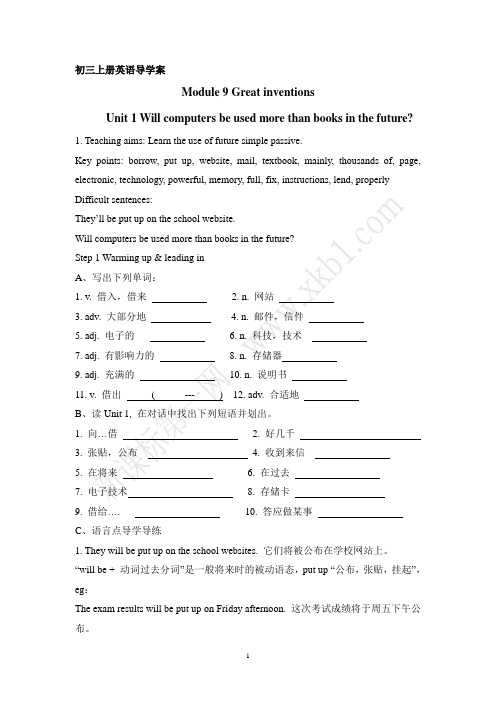
初三上册英语导学案Module 9 Great inventionsUnit 1 Will computers be used more than books in the future?1. Teaching aims: Learn the use of future simple passive.Key points: borrow, put up, website, mail, textbook, mainly, thousands of, page, electronic, technology, powerful, memory, full, fix, instructions, lend, properly Difficult sentences:They’ll be put up on the school website.Will computers be used more than books in the future?Step 1 Warming up & leading inA、写出下列单词:1. v. 借入,借来2. n. 网站3. adv. 大部分地4. n. 邮件,信件5. adj. 电子的6. n. 科技,技术存储器说明书合适地B1. 2. 好几千3. 4. 收到来信5. 在过去7. 存储卡9. 借给…. 10. 答应做某事C、语言点导学导练1. They will be put up on the school websites. 它们将被公布在学校网站上。
“w ill be + 动词过去分词”是一般将来时的被动语态,put up “公布,张贴,挂起”,eg:The exam results will be put up on Friday afternoon. 这次考试成绩将于周五下午公布。
2. But today, we can send and receive photos and mails on the Internet, and it’s really fast. 但是现在,我们可以通过因特网发送、接受照片和邮件,而且它真的很快捷。
外研版九年级上册Module 9 Great inventions Unit 1(共41张PPT).pptx

16.with thousands of pages有几千页 17.with the invention of the computer and the electronic technology 随着电脑和电子技术的发明
18.the memory card储存卡 19.be full满的 20.an empty memory card空的 21.be fixed被修复 22.read the instructions看说明书
Module 9 Great_i_n_ve_n_t_ions
invent 动词,发明,创造 inventor 名词,发明家Байду номын сангаасinvention 名词,发明,创造
Unit 1 Will _co_m_p_u_t_e_rsbe _u_s_e_d more than _b_o_ok_s_ in the future?
Toilet
Do you know the following inventions? Who invented them, and when?
paper Cai Lun 105 A. D.
printing Bi Sheng 1041-1045
compass the 11th century
gunpowder the 9th century
car Karl Benz in 1885
steam engine James Watt in 1776
telephone Alexander Graham Bell in 1876
electric bulb Thomas Alva Edison in 1876
calculator in 1971
1. They’ll be put up on the school website. And they can be seen on the Internet by other classes, even people living in other countries.
Module9Unit1(知识精讲练习)九年级英语上册精品讲义(学生版)
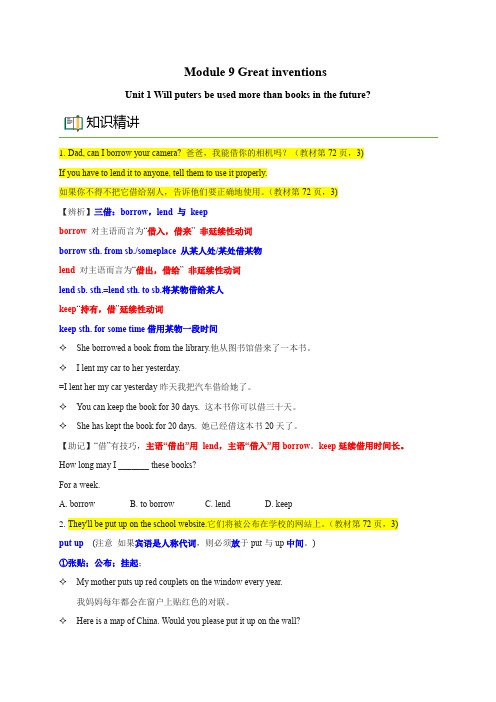
Module 9 Great inventionsUnit 1 Will puters be used more than books in the future?知识精讲1.Dad, can I borrow your camera? 爸爸,我能借你的相机吗?(教材第72页,3)If you have to lend it to anyone, tell them to use it properly.如果你不得不把它借给别人,告诉他们要正确地使用。
(教材第72页,3)【辨析】三借:borrow,lend 与keepborrow对主语而言为“借入,借来” 非延续性动词borrow sth. from sb./someplace 从某人处/某处借某物lend对主语而言为“借出,借给” 非延续性动词lend sb. sth.=lend sth. to sb.将某物借给某人keep“持有,借”延续性动词keep sth. for some time借用某物一段时间✧She borrowed a book from the library.他从图书馆借来了一本书。
✧I lent my car to her yesterday.=I lent her my car yesterday昨天我把汽车借给她了。
✧You can keep the book for 30 days. 这本书你可以借三十天。
✧She has kept the book for 20 days. 她已经借这本书20天了。
【助记】“借”有技巧,主语“借出”用lend,主语“借入”用borrow。
keep延续借用时间长。
How long may I _______ these books?For a week.A. borrowB. to borrowC. lendD. keep2.They'll be put up on the school website.它们将被公布在学校的网站上。
凤凰县第五中学九年级英语上册 Module 9 Great inventions Unit 1 W

Module 9 Great inventionsUnit 1➢重点单词1. borrow v.借入;借来2. website n.网站3. mail n.邮件;信件【新义v. 邮寄; 用电子邮件传送】4. textbook n.教科书;课本5. mainly adv.大部分地;主要地6. page n.页;一页 (纸)7. electronic adj.电子的8. technology n.科技;技术9. powerful adj.有影响力的;能控制他人的10. memory n.存储器;存储量11. full adj.满的;充满的【新义 adj.饱的;充实的;充分的】12. fix v.修补;挽救13. instructions n.[复数]说明书14. lend v. (把某物)借出, 借给(某人)15. properly adv.合适地;正确地➢词形变换1. main adj.主要的 mainly adv.大部分地;主要地2. power n. 力量 powerful adj. 有影响力的;能控制他人的3. lend v. (把某物)借出,借给 (某人) 反义词 borrowv. 借入;借来4. proper adj. 合适的;适当的 properlyadv.合适地;正确地➢重点短语1. take photos 照相2. put up 张贴;公布3. on the Internet 在网上4. wait for 等待5. hear from 收到……的来信6. in the future 在将来7. in the past 在过去8. thousands of 好几千;成千上万9. electronic technology 电子技术10. memory card 存储卡11. take (good) care of (好好)照顾➢重点句型1. 它们将被公布在学校的网站上。
They’ll be put up on the school website.2. 那可以解决。
- 1、下载文档前请自行甄别文档内容的完整性,平台不提供额外的编辑、内容补充、找答案等附加服务。
- 2、"仅部分预览"的文档,不可在线预览部分如存在完整性等问题,可反馈申请退款(可完整预览的文档不适用该条件!)。
- 3、如文档侵犯您的权益,请联系客服反馈,我们会尽快为您处理(人工客服工作时间:9:00-18:30)。
Module 9 Great inventionsUnit 1Will computers be used more than books in the future?词汇put up,website,mail,thousands of,page,el ectronic,full,fix,memory,instructions,lend,properly,put up,wait for,take good care of,lend … to …句型 1.They'll be put up on the school website.2.And they can be seen on the Internet byother classes,even people living in othercountries.3.When I was at school,we waited for weeksto hear from our pen friends abroad.4.… you must promise that you'll takegood care of it.5.If you have to lend it to anyone,tellthem to use it properly.重点难点 1.本单元词汇和重点句子。
2.一般将来时的被动语态。
【教学思路】本单元的主要任务是听和说。
第一部分通过听与新发明和新技术有关的对话,学会向他人借东西时所用的英语表达方法。
通过对数码相机、网络的讨论了解旧时代与新时代的区别,培养学生的英语思维方式,锻炼学生的英语表达能力。
主要句型有“Can I …?”“I wonder …”“You must promise that …”首先,教师用对话的形式介绍数码相机的用途,导入新课。
其次,展示有关现代发明的卡片,并向学生提出问题,让学生讨论回答。
然后,听录音完成句子(Listen and complete the sentences),并要求学生听读对话(Listen and read),锻炼学生的口语和听力能力,最后完成活动4和活动5。
第二部分包括语音和说;让学生听句子并注意句子的停顿处,最后让学生两人一组,讨论car,computer,email,mobile phone,TV,washing machine给人们带来的便利。
【教学准备】黑板,录音机,教学卡片,多媒体等。
【教学过程】Step 1 Warming up & Leading in师生问好后,教师手拿实物(数码相机)向学生展示它的用途,并与学生进行对话。
T:Good morning!Ss:Good morning,teacher.T:Look at the digital camera in my hand.What do you think of the digital camera?Ss:I think i t's great/pretty good …T:Do you have one?Ss:Yes,I do./No,I don't.T:Now 1 will show you how to use it ….Then,the photos will be put up on the school website.They can be seen by all of the students,even people living in other countries …活动小结:教师通过与学生自由谈论数码相机导入新课的学习,并在对话的过程中有意识地加入对话中的句子和被动语态,既活跃了课堂气氛,也能让学生比较迅速地进入到学习状态中,提前熟悉新课的内容。
Step 2 Listening & Vocabulary1.Listening and vocabulary(1—2)(1)教师展示图片:电脑、数码相机、手机等。
然后提出问题:What are they used for?How have these inventions changed people's life?Which one do you think is the most important?What other important inventions can you think of?让学生进行讨论(五分钟)。
学生自由回答,老师对于任何回答都应该给予鼓励。
(2)Listen and complete the sentences.首先给学生2分钟去理解句子,然后播放录音,听力完成后,学生给出答案,教师领读所填内容。
2.Listening and vocabulary(3)(1)学习关于活动3的新单词。
①教师把一张地图贴到黑板上,并叙述:Look!What am I doin g now?I am putting up a map on the blackboard.教学生学习短语“put up”,并让学生跟读短语,对这个短语进行操练。
②教师向学生介绍网络的用途(涉及到的新词有:website,mail)。
The Internet is playing an important part in our life.On the Internet,we can learn news both at home and abroad and all kinds of other information as well.We can also send messages by mail,make phone calls,look through all kinds of websites and learn foreign languages by ourselves.Besides,we can e njoy music,watch sports matches and play games.On the Internet we can buy something we need,such as,clothes,tickets and so on.In a word,the Internet has made our life more colourful.③教师出示一张图片,一名学生正在图书馆借书。
教师指着图片问:What is the student doing?学生回答,教师最后总结。
T:He is borrowing a book.He is borrowing a book from the school library.So the librarian is lending the book to him.(引出lend这个单词,并与borrow进行对比讲解) 知识点讲解:borrow指“借入,借进”(从他人那里借某东西为己方所用),常用短语:borrow sth from sb。
lend是借出去(借给他人),常用短语:lend sth to sb/lend sb sth(通常跟双宾语)。
区别时关键看主语,是主语借给别人就用lend,主语向别人借就用borrow。
如:Can I borrow your bike?我可以借用你的自行车吗?He lent his dictionary to me.他把字典借给我。
操练:(教师给出重点词汇,让学生造句)④教师展示第二张图片,一张数码相机的照片。
教师解释这张图片:This is a digital camera.It's new.So I don't know how to use it.When it is broken,I don't know how to fix it up,either.What should I do?(如果学生听不懂,教师要及时重复)通过学习“fix”这个单词引导学生说出“Look at the instructions.”这句话,学习新词:instructions。
(2)操练单词给学生几分钟时间记单词,然后教师把带有单词的卡片拿出来让学生依次拼读。
教师可以把学生分成几组进行单词拼读比赛。
(3)Practice in pairs.(通过角色扮演的方法,完成第3部分的练习)3.Listening and vocabulary(4—5)(1)在对话在中找出同义句:教师要求两个学生领读和翻译活动4中的句子,让学生充分理解这三个句子的含义,然后给学生3分钟的时间在对话中找到同义句,最后小组讨论出正确答案,教师核定。
(2)让学生仔细读对话,回答活动5中问题。
让学生根据自己的实际情况来回答问题,同时注意使用重点词汇。
该环节采用抢答得分的方式来进行。
活动小结:教师以图片的形式导入新单词的学习,以图记忆,通过图片的形式拼读,加深记忆。
找几名学生比赛记单词,巩固记忆。
通过多种形式调动他们的学习积极性。
Step 3 Pronunciation & Speaking1.Pronunciation and speaking(6)让学生听录音,在停顿的单词后标上记号。
然后再听一次,学生跟读模仿以达到流利的程度。
2.Pronunciation and speaking(7)(1)教师呈现一些图片和关键词,谈论这些发明的优点。
采用个人、小组、全班等操练形式,启发学生说“use sth to do sth”句型。
例如:T:Well!There are many inventions in our life.Can you tell me their advantages?(幻灯逐一显示发明物图片和关键词,学生讨论)S1:We use mobile phones to communicate with others.S2:Yes,we can use mobile phones to communicate with others quickly and freely.(2)教师最后让学生分别描述这些发明是如何改变人们的生活的。
活动小结:为了使读课文回答问题这一环节变得有趣,引入竞赛机制,调动学生的积极性。
Step 4 Practice小组讨论下列发明的优点,并描述这些发明怎样改变了人们的生活。
(教师用多媒体呈现出多种发明)Step 5 Make a summary1.教师对文章中的短语、句型进行梳理,并且就容易出错的语言点进行说明。
2.带领学生读写文中含有被动语态的句子。
Step 6 Game timePlay a game:guess a puzzle!(猜谜语)T:You can use it to call anyone anywhere.It can be used to communicate with others,send messages and listen to music.It has been invented for many years.It's useful in our life.What is it?Can you guess?Ss:It's a mobile phone.…活动小结:对本单元的知识点进行复习,用游戏来发展学生的思维。
